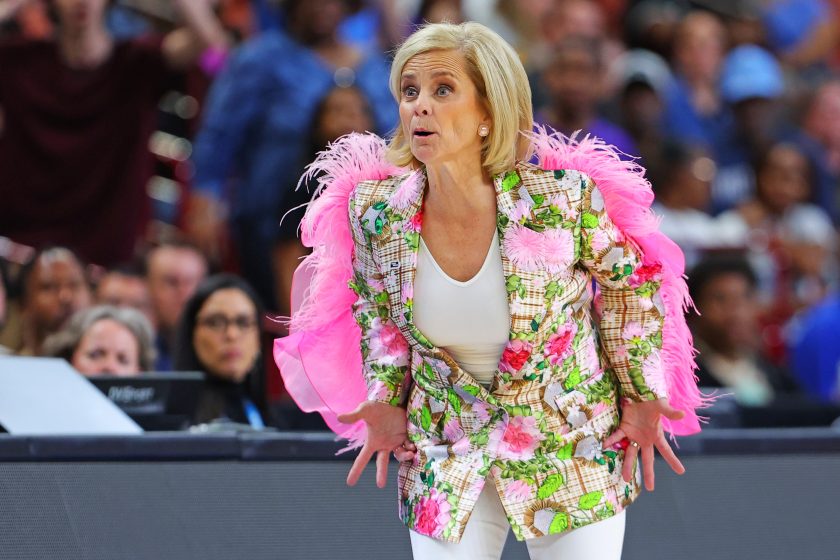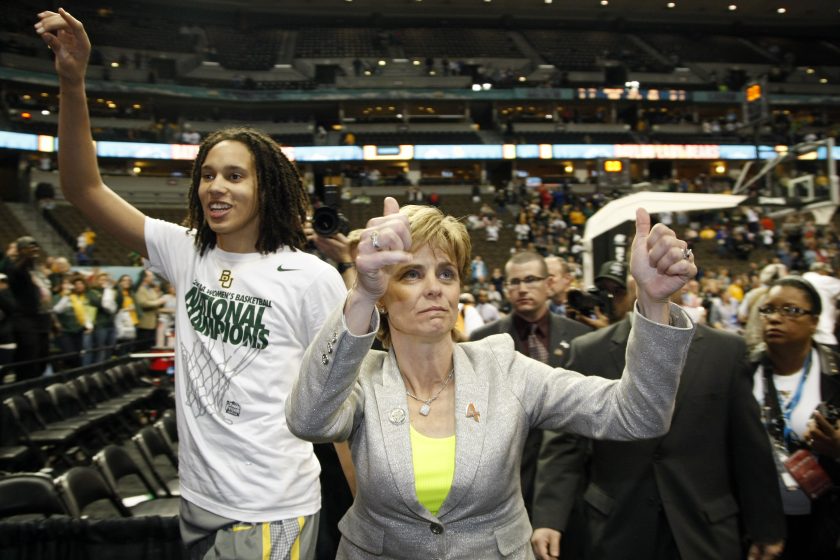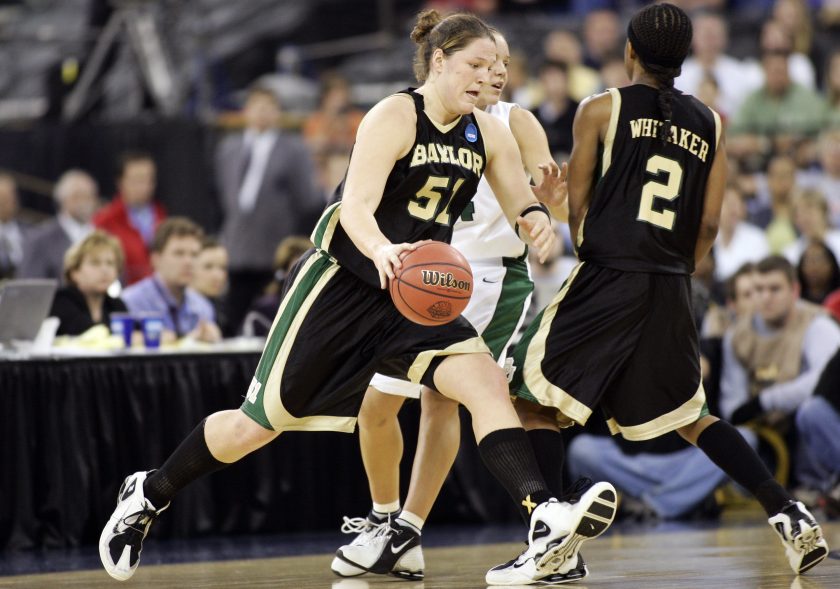There aren't many people on Earth that have accomplished what Kim Mulkey has in women's college basketball.
Videos by FanBuzz
Her .860 winning percentage and 802 wins are rivaled only by UConn's Geno Auriemma and Tennessee legend Pat Summit. She was the first to ever win an NCAA national championship as a player, assistant coach and head coach. She's a member of the Women's Basketball Hall of Fame and the Naismith Memorial Basketball Hall of Fame. At Baylor, she quickly ascended to stardom by orchestrating one of the great dynasties in the sport more than two decades ago.
But as Mulkey's three-seed LSU Tigers prepare for a Final Four matchup against one-seed Virginia Tech on Friday night with a chance at capturing her fourth national title, we need to remember what kind of ambassador she's been for the sport.
Everything she's done in women's basketball comes with an asterisk. A big, fat most-definitely-not-rainbow asterisk.
Kim Mulkey's History of Homophobia in a Very Gay Sport
Photo by Kevin C. Cox/Getty Images
RELATED: Kim Mulkey's Son Was the First Family Member to Put LSU on the Map
Women's basketball is gay. Gayer than any professional or college sport out there, at least as far as we know according to the number of out players. One in five players in the WNBA are out and proud members of the LGBTQ community. The NCAA features plenty of queer athletes as well. Even at the Elite Eight, three teams had publicly out coaches, including Miami head coach Katie Meier.
Enter Kim Mulkey, a coach who has done nothing but suppress her players' sexualities and foster environments of fear where she's coached. Those aren't my words. Just ask her former players.
Brittney Griner, the famed 6-foot-9 dunkmonster of the 2011-12 national champion Baylor Bears that went 40-0, said she was encouraged by Mulkey to stay in the closet while in college. Of course, this was at Baylor, a private, Christian university whose official stance on marriage is that it should be between man and woman. Still, what does that say about Mulkey?
"It was a recruiting thing. The coaches thought that if it seemed like they condoned it, people wouldn't let their kids come play at Baylor," Griner told ESPN in 2013, the same year she came out and was drafted by the WNBA's Phoenix Mercury.
"It was more of an unwritten law [to not discuss your sexuality]... It was just kind of, like, one of those things, you know, just don't do it. They kind of tried to make it like, 'Why put your business out on the street like that?'"
Even when Griner was wrongfully detained in Russia for 294 days, Mulkey wouldn't come to her defense. A reporter asked for the LSU coach's thoughts on Griner's detainment, to which she said "you won't" hear her opinions on that situation. Keep in mind Griner scored 23.2 point per game during that undefeated season and helped cement Mulkey's place in women's basketball with that national title.
Brittney Griner Has Spoken Out About Mulkey
Jamie Schwaberow/NCAA Photos via Getty Images
"I would love to be an ambassador for Baylor, to show my school pride, but it's hard to do that... I've spent too much of my life being made to feel like there's something wrong with me. And no matter how much support I felt as a basketball player at Baylor, it still doesn't erase all the pain I felt there," Griner wrote in her book, "In My Skin."
Another former Baylor basketball player, Emily Nkosi, also spoke about the homophobic culture under Mulkey. Nkosi, formerly Emily Niemann, played from 2003-05 and won a national championship while in Waco.
"I had no idea what coach Mulkey would actually say if I told her I was gay in 2005, but I had enough information from my life experiences to be afraid," Nkosi told OutSports in 2014.
However, Nkosi recognized who Mulkey worked for and the region she worked in. She still wishes she could have set a better example for players after her like Griner.
"Coach Mulkey is a member of an athletic department, a school, a town, a state and even a region that is known for its conservative belief system, which very much includes homophobia. As leader and icon in each of these arenas, coach Mulkey has been unfairly singled out as particularly homophobic based on what happened with me and then Brittney Griner. But in my experience she did not express opinions that were different from the dominant belief system held in that community."
Emily Niemann, who now goes by Emily Nkosi, dribbles for Baylor during the 2005 NCAA Women's National Championship Game. (Jamie Schwaberow/NCAA Photos via Getty Images)
Mulkey could have been a trailblazer at Baylor. They weren't going to fire the winningest coach in program history, one who had Baylor contending for a national championship every year. She could have created an inclusive environment on and off the court, but it's clear she didn't. And she didn't want to.
Once, when she was asked by OutSports' Cyd Zeigler if she had any gay players on her team, she responded: "Don't ask me that. I don't ask that. I don't think it's anybody's business. Whoever you are. I don't care to know that." When he asked her if it mattered to her, she said "no."
So the next time Kim Mulkey is hitting the griddy after an LSU win whenever that may come — in the Final Four, national title game or next season — I won't be celebrating her. She's shown enough of her true colors, and there isn't any rainbow in them.



